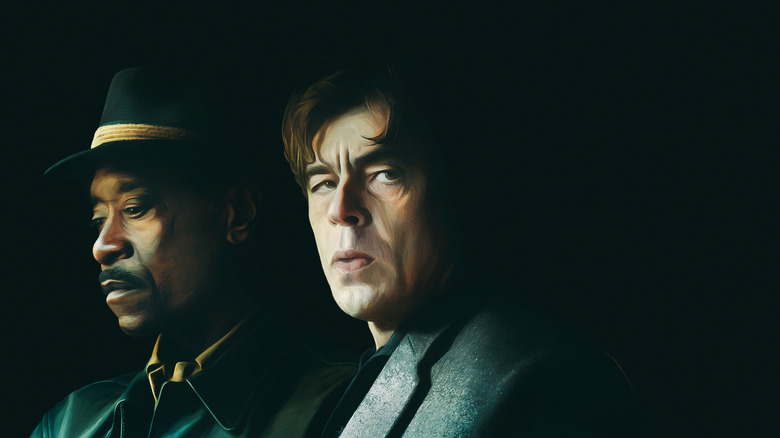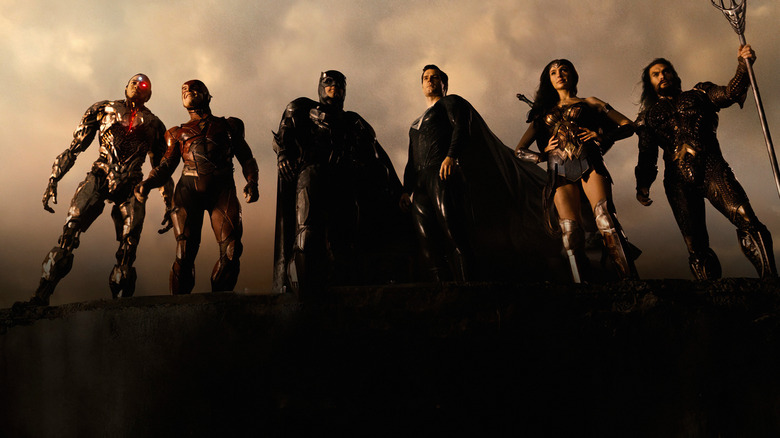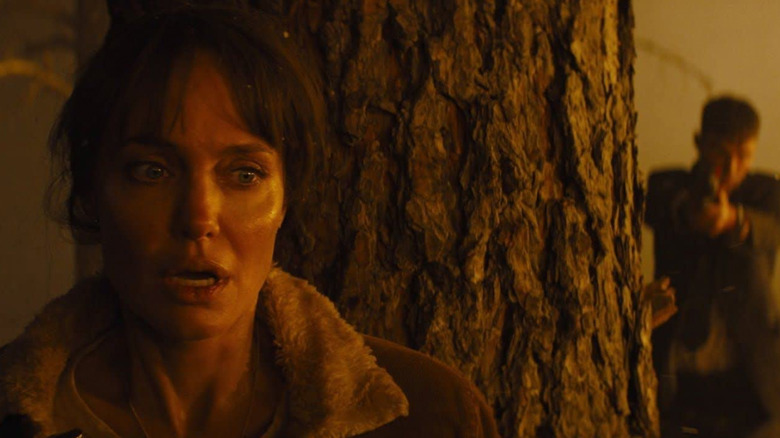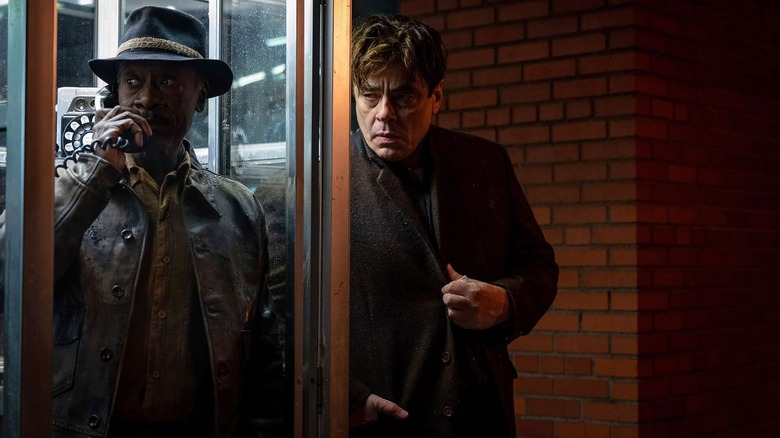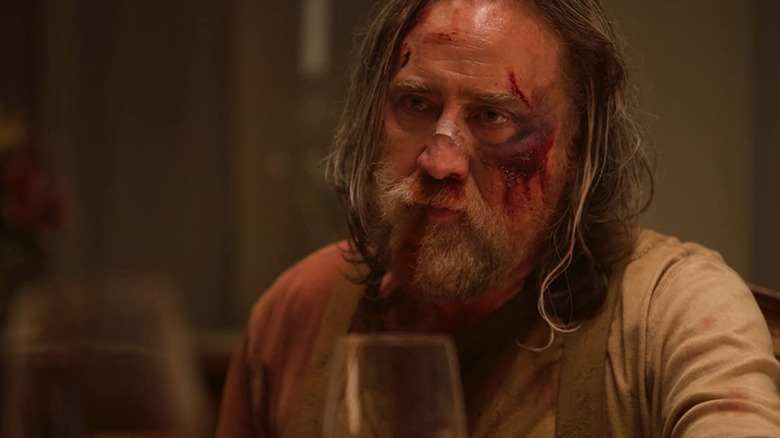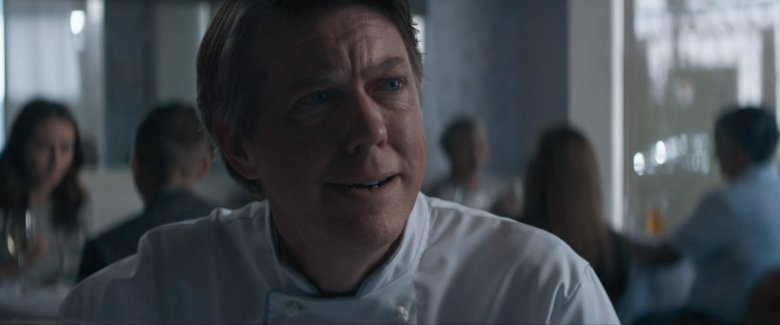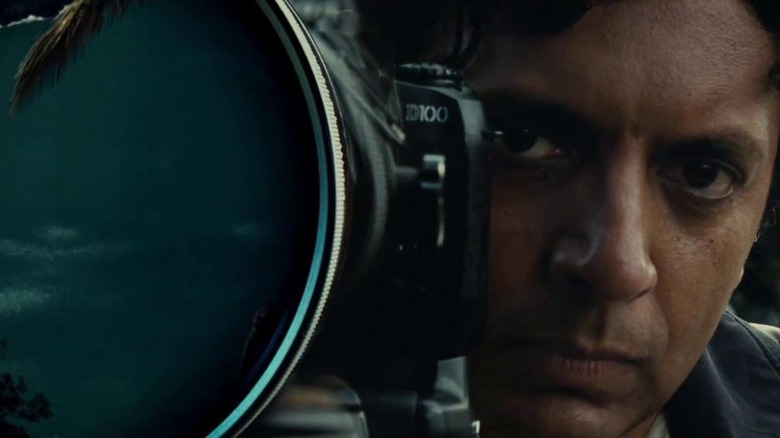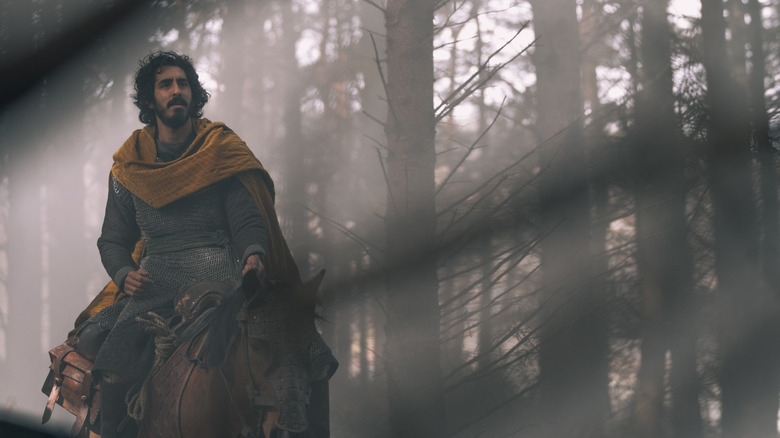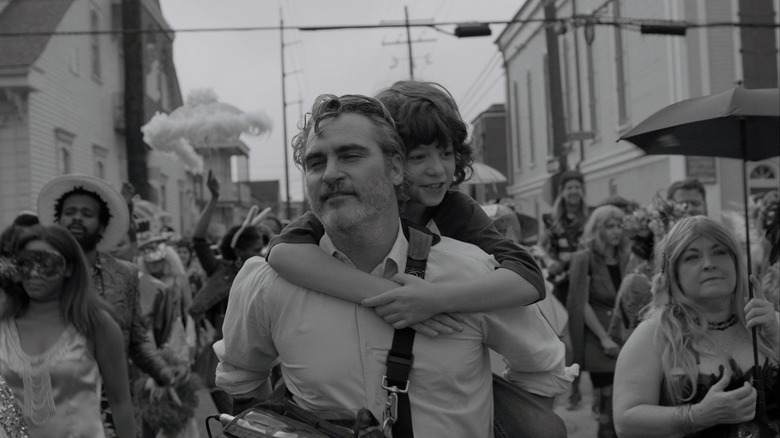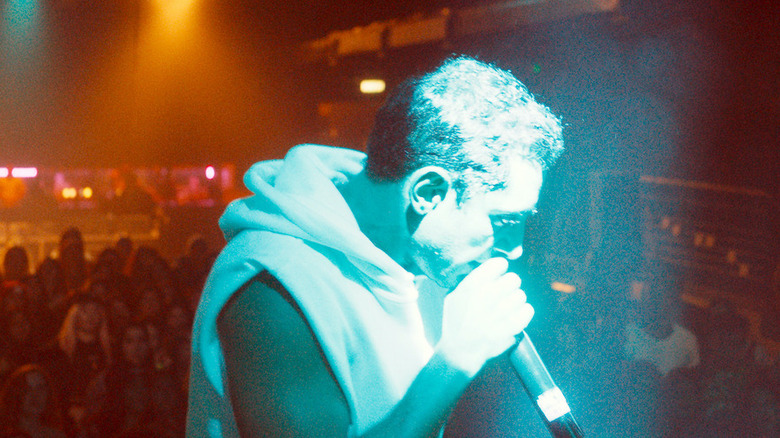Under The Radar: The Most Underrated Movies, Performances, And Moments Of 2021
(Welcome to Under the Radar, a new column where we spotlight specific movies, shows, trends, performances, or scenes that caught our eye and deserved more attention ... but otherwise flew under the radar. In this edition: a round-up of 2021 as a whole.)
Can we talk about how we talk about entertainment for a second?
For as long as I'm paid to write about pop culture on the internet, I can promise that you'll never see me describe anything as "overrated." Not only does anyone using it usually come across as smug and dismissive, but there's no getting around how the very word itself (by definition!) only deals with the overall reaction to any given movie or show — not the actual merits of the movie or show itself. "Overrated" implies some hypothetical, universal standard of how we "ought to" feel, all while conveniently ignoring how one could possibly ever quantify such a vague, ill-defined, and incredibly subjective notion in the first place. Worst of all, "overrated" simply doesn't foster discussion; it instantly shuts it down.
Hopefully, this is where "Under the Radar" comes in. If I've done my job right, it'll come as no surprise that I feel strongly about fostering a better kind of conversation. My aim for this series is to search for under-appreciated gems that may or may not receive their just due come awards season; to highlight certain noteworthy elements of movies or television that demand further exploration; to pinpoint those transformative storytelling moments that defy easy labels and don't necessarily lend themselves to viral-ready memes, 280-character tweets, or social media trending topics. Though the premise of this column might imply that the most popular titles need not apply here, we won't discriminate between blockbusters or indies, Oscar darlings or unabashed genre exercises, box office success stories or commercial flops. Ideally, this will be a place for nuance, discovery, and honest analysis of all the most overlooked puzzle pieces that come together to make stories work. It'll also provide a fantastic opportunity to, you know, yell at me on Twitter about anything and everything I unforgivably leave out, too.
So on that note, let's use this inaugural edition to take a trip back to the year that was and single out 10 specific aspects of 2021's movies and television that ultimately, for one reason or another, flew under the radar.
Zack Snyder's Justice League Gives Us a Look Behind the Curtain
I know, I know. Bold move to kick things off with one of the most fiercely-debated movies in all of 2021, right?
As strange as it may seem to highlight "Zack Snyder's Justice League," I'd argue one important takeaway fell by the wayside amid the fraught circumstances surrounding its controversial release. Here, against all odds, fate delivered a rare opportunity to dig into both the 2017 theatrically-released "Justice League" and this new, wildly different version and take note of how the filmmaking sausage gets made ... and very few fans, if any, bothered to do so. Not that I expected much else from a tribalistic and toxic fandom, but the response felt disappointing all the same.
Think of it like this: presuming a healthy curiosity for the medium of film, the best way to learn more is to study the behind-the-scenes process. It's one thing to simply know that 2015's "Fantastic Four," "Solo: A Star Wars Story," or any number of movies through the decades started out one way and turned out differently. It's another thing entirely to see those changes for ourselves. In effect, both cuts of "Justice League" function as an invaluable, insightful exercise in how much can change in the edit.
This doesn't just apply to the obvious differences, either, like reinstating the backstory for the villainous Steppenwolf or Superman donning his black suit (tragically, sans beard or even mustache). Consider one minor example, like Cyborg's first meeting with Wonder Woman. Where Victor Stone dramatically flies in and land at Diana Prince's feet in Snyder's cut, the theatrical haphazardly mixes reshoots with original footage to have him slink out of the shadows in an alleyway. One version is obviously centered around his grand reveal, keeping the camera close to the ground to maximize the impact of his aerial arrival.
The other ... well, just look at this jarring, counterintuitive shot selection, seemingly changed for no other reason than to ward off potential CinemaSins logic nitpicks about why a superhero in hiding would make such a public entrance. (Answer: because it's cool as hell!)
Fans can consider this a beginner's guide to how meaningful cuts and purposeful camera placement comprise the technical basics of filmmaking. Looking back, "Zack Snyder's Justice League" inadvertently gave us 2021's most unexpected and eye-opening look at how movies are made.
Angelina Jolie Reignites the Movie Star in Those Who Wish Me Dead
Where do you stand on the Great Movie Star Debate?
Many cultural critics have argued that the concept of genuine movie stars — you know, the kind that instantly puts butts in seats and can singlehandedly carry any production on their backs to box office salvation — have become a dying breed. Sure, Tom Cruise is still doing his thing and Chris Hemsworth and the other Marvel Chrises seem to meet that criteria, but did anyone bother showing up in significant numbers for less recognizable efforts outside the franchise machine, like "Bad Times at the El Royale," "Blackhat," or "American Made"?
However, one old-fashioned 2021 film helped revive some hope that, perhaps, we need not give up on the movie star just yet. Upon release in May of 2021, Tayler Sheridan's "Those Who Wish Me Dead" felt like a small light in the darkness — ironic, given its fire-and-brimstone premise. Not only does the film stay far away from the typical IP-obsessed mindset of studios these days, but the very specific way it uses its star brings to mind any number of no-frills, no-nonsense films of yesteryear.
Angelina Jolie commands the screen as Hannah Faber, a "smokejumper" firefighter who parachutes her way into forest fires from above. Such bold feats come with the abrasive temperament to match, though she's all but grounded by the time the film begins on account of her lingering PTSD from a jump gone terribly wrong. Sheridan takes her on a collision course between a lost child on the run from the hitmen sent to kill his dad, a forest fire raging out of control, and the demons of her past. It's precisely the kind of "Grizzled loner in need of redemption" Dad Movie™ that could've starred Harrison Ford or Robert Redford at comparable points in their careers (or perhaps John Travolta or Nicolas Cage, as /Film's Chris Evangelista notes in his review), adding even more '90s throwback energy to the proceedings.
Unfortunately, "Those Who Wish Me Dead" fizzled out in theaters during limited release (though it's streaming on HBO Max), bringing daydreamers like me crashing back to Earth and reminding us that we live in a very different, pandemic-affected landscape now. Yet its simple goals, old-school feel, and legendary action star make it a rare, underappreciated thriller worthy of a closer look.
No Sudden Move: Soderbergh Keeps Making It Look Easy
"My God ... it's only Tuesday."
Few directors are able to rival Steven Soderbergh in terms of sheer output on a year-in and year-out basis, making his hit-to-miss ratio through the decades all the more impressive. But when he's at the top of his game, I would argue that nobody outdoes his uncanny ability to depict crime as either the most spectacularly alluring carrot on a stick that you've ever watched on the big screen ... or a never-ending, thoroughly exhaustive exercise in futility and mistakes made. While constantly keeping viewers on their toes through the many fun twists and turns of writer Ed Solomon's script, "No Sudden Move" firmly lands in the latter category of Soderbergh's crime dramas, with the added punch of the above quote delivered in the late stages of the film by a monumentally defeated David Harbour, and it's all the better for it.
At first glance, the 1950s Detroit-set "No Sudden Move" appears to betray somewhat low ambitions. Don Cheadle's Curtis Goynes is fresh out of jail and in serious need of some quick cash to start his life over again, while Benicio Del Toro's Ronald Russo appears to be on a quest to rewrite his unflattering reputation as a gangster who is alternately described as "unpredictable," "untrustworthy," and "sloppy" (the first two delivered by a menacing Ray Liotta, the last by a pitch-perfect Brendan Fraser). The job? "Babysitting" the terrified family of Matt Wertz (Harbour), a number-pushing accountant for car manufacturer GM, while their third associate (played by trigger-happy Kieran Culkin) extorts the in-over-his-head Wertz into retrieving a work document containing sensitive information — a deceptive MacGuffin that hangs over the head of the entire plot like the grim reaper itself.
Almost like a thematic cousin to Shane Black's similarly automobile-focused "The Nice Guys," Soderbergh's latest steadily unravels and reveals its greater focus from a couple of low-level criminals caught between two rival crime bosses and the score of a lifetime, to an industry-spanning conspiracy with unimaginably wide-ranging ramifications. The bleak ending (which, according to Solomon himself, could've been even bleaker), the purposefully disorienting warping effect caused by using wide-angled anamorphic (and period-accurate) lenses, and a practically acidic script help transform this otherwise slick, breezy caper into one of 2021's most pleasantly surprising gut-punches, as paradoxical as that sounds. May Steven Soderbergh never actually retire.
Pig (or the Unexpected Emotional Devastation of A Dinner Scene)
There's probably a hypothetical version of "Pig" where the premise is played for laughs or over-the-top action, as happens in other Nicolas Cage movies like "Prisoners of the Ghostland" or the upcoming "The Unbearable Weight Of Massive Talent." That's what most of us assumed upon first hearing about the film's initial plot description, involving the theft of his truffle-hunting pig and subsequent vengeance quest to recover it. Instead, writer/director Michael Sarnoski's directorial debut is thoughtful, melancholy, and shockingly restrained, using the field of culinary arts to sneak in larger questions about life, loss, and unrealized potential. Cage's soulful performance as the grungy, beat-up Robin Feld — a famous chef who dropped off the map over a decade prior — has rightfully earned praise in the months since release and the industry has taken notice of Sarnoski's work, snatching him up into franchise land with the next "A Quiet Place" movie.
So with those qualities already spoken for, I'll focus instead on one of two quietly devastating moments in "Pig" set around (fittingly enough) dinner tables, both of which calibrate the depths of Robin's loss of his pig. The show-stopper comes at the climax of the film, which has similarly received due recognition, but the first arrives about an hour into the film. Robin and truffle-buyer Amir's (Alex Wolff) impromptu investigation leads to an unbearably gimmicky, high-end Portland, Oregon restaurant that just so happens to be run by Robin's former employee. The surprisingly tense 10-minute sequence that follows between Cage and David Knell's Chef Derek Finway is breathtaking in its surgical precision. Though he attempts to brush over his complicity in stealing the pig, Robin changes tact and juxtaposes the chef's inauthentic restaurant with Derek's unrealized dream of starting a pub to cut through the artifice of his worldview.
"They're not real. You get that, right? None of it is real. The critics aren't real, the customers aren't real, because this isn't real. You aren't real."
Of all the movie scenes in 2021, David Knell's face crumbling in front of our eyes in response to Cage's empathetic, yet honest assessment of how he's lost his way is an image I can't forget. So many characters in "Pig," Robin included, put up barriers to shield themselves from truths they'd rather not face. This one conversation captures that theme to powerful effect.
Old: Surrendering to Shyamalan
Say what you will about "Old," the movie where a bunch of people become trapped on the beach that makes you old, but viewers don't have to wait very long to realize what kind of tone it's trying to establish. Early on in M. Night Shyamalan's script, Vicky Krieps' Prisca wistfully takes in her young daughter's singing voice and follows with the bluntly on-the-nose remark that she "...can't wait to hear it when you're older," we're introduced to a rapper named "Mid-Sized Sedan" (Aaron Pierre), and Shyamalan himself cameos as the ostensible villain of the story. And to think that some people still had the audacity to try and act like the filmmaker somehow wasn't in on his own joke!
If "overrated" stands out as my biggest pet peeves in film discussions, then putting on airs and taking the default position that silly dialogue or concepts in movies couldn't possibly have been done intentionally would be a close second. "Old" is a self-examination of mortality, a deeply personal attempt to wrestle with parental fears, and simply a fun, unsettling horror flick all at once ... but it's also extremely, obviously, and self-assuredly comedic at times. For whatever reason, however, our instinct as viewers is to assume that we're superior to what we're watching. I wouldn't say "Old" is flawless or even one of my favorites among Shyamalan's filmography, but I don't think it's asking too much to meet the film halfway and on its own terms.
While many will never be satisfied until the divisive director returns to his glory years of "The Sixth Sense" and "Unbreakable," "Old" takes a much different (and, in my view, much more interesting) approach in blurring the line between horror and outright schlock. The deaths and body horror are played straight with as much tension as the camera can wring out of them, but familiar "Shyamalanisms" like stilted dialogue/acting, a willingness to mess around with tone, and a wry sense of self-aware humor reveal a filmmaker who has learned to crawl out from under the crushing weight of outsized expectations early on in his career and forge his own identity. Given that he's one of the very few directors currently telling original stories and bringing in general audiences on name recognition alone (the others being Christopher Nolan and Jordan Peele), I'd say he's doing something right.
The Green Knight: It's Dev Patel's World and We're All Just Living In It
It's thrilling to watch a reliable, hard-working actor in their latest role and suddenly realize that you're witnessing the culmination of a journey into something more than "just" an actor — a performer, an artiste (okay, I'll rein in the pretentiousness a bit), or maybe, just maybe, a star in their own right. A retelling of a timeless and authorless piece of Arthurian legend wouldn't seem to lend itself to such a grand proclamation, but that's precisely what Dev Patel and writer/director David Lowery accomplish.
In many ways, "The Green Knight" boasts all the trappings of traditional arthouse fare that makes average moviegoers flee in the opposite direction: an ambiguous ending; a story predominantly told through color, atmosphere, and symbolism; and almost a built-in requirement that one be familiar with the original text before even attempting to parse the meaning of the film's faithfulness and divergences. All of that combines to explain the glaring discrepancy between the glowing critic rating and the more tepid audience rating on Rotten Tomatoes ... but if that deterred you from checking this film out the first time around, then I'm here to inform you that you made a grave mistake.
My argument begins and ends with only two words: Dev Patel.
Although if you'll allow me to offer the somewhat longer version, I would point to Hoai-Tran Bui's review for /Film and Angeline Rodriguez's Polygon article, both of which get right to the heart of why his casting works so well as the not-yet-knight Gawain. He's hot and talented, he plays Gawain's brashness and eagerness to prove himself (and, inevitably, his unlikability) without a hint of irony or self-consciousness, and his unmistakable South Asian heritage adds several layers of subtext to the epic poem. The push and pull between Patel's rugged exterior and boyish charm immediately grants a lived-in feel to his relationship with Alicia Vikander's prostitute Esel, and he proves equally as adept at handling the much darker and more disturbing paths Gawain takes in the latter half of the film. In short, Patel's casting does everything a storyteller could ever want from a lead, elevating what was already on the page to another level entirely.
"The Green Knight" takes its cues from Dev Patel by alternately beguiling, repelling, and ultimately challenging its intended audience.
Exploring Memory and the Mundane in C'mon C'mon
I've anticipated director Mike Mills' next feature film ever since 2016's "20th Century Women," which stands tall as one of my absolute favorites of the last decade or so, only narrowly missing out on my personal list of defining movies (a ranking I felt unsatisfied with roughly 10 minutes after submitting it, mind you) because I felt it needed a little more time to breathe. Needless to say, last year's "C'mon C'mon" didn't let me down. In fact, both this and "20th Century Women" are more alike than you might think, despite the vast gulf in their respective settings. The two coming-of-age, slice-of-life stories revolve around aimless young people heading towards an uncertain, oftentimes frightening future. "C'mon C'mon" merely makes this journey literal, taking Joaquin Phoenix's emotionally distant uncle Johnny on a road trip to bond with his openhearted nephew Jesse (Woody Norman) while interviewing students from across the United States and asking them their thoughts on the current world, their place in it, and their hopes/fears for the future.
The black-and-white picture feels remarkable for, well, how thoroughly unremarkable it is. Mills doesn't clutter up his script with dramatic plot twists, insipid contrivances, or manipulative storytelling to spice up a relatively plotless mood piece. What you see is what you get ... but, at the same time, the filmmaker's extraordinarily steady hand behind the wheel allows viewers to uncover layer upon layer of meaning from a glance, an unspoken word, or brief moments of panic when Johnny thinks he's lost Jesse (on multiple occasions!) in the streets of New York City. Many an arthouse film has reached similar conclusions about how hard parenting is, but "C'mon C'mon" breathes new life into this familiar territory by ceding time and space to Johnny's overwhelmed sister Viv (Gaby Hoffmann) and her struggling husband Paul (Scoot McNairy).
Like "20th Century Women," "C'mon C'mon" also ends up circling back to the idea of memory – in this case, Johnny's job as a radio journalist allows him to capture voices, cityscape sounds, and his own private reflections of taking care of Jesse, all taking shape in an extended audio journal of sorts. When young Jesse frets about his uncle's nonchalant assertion that he'll forget their experiences together when he grows up, Johnny offers comfort the best way he knows how: "I'll remind you of everything."
Star Wars: Visions Makes the Franchise Feel New Again
Confession time. You might think this column is written from the perspective of some insufferably holier-than-thou snob, but may this entry rid you of that notion entirely. After putting it on the record (not once, but multiple times) that I simply couldn't wait to watch "Star Wars: Visions" for its bold, inventive, and refreshingly new approach to telling stories in this sprawling universe, I ... promptly did just the opposite and forgot all about the anime series until a few short weeks ago. Mea culpa, folks. I'm just as guilty of passing up on quality entertainment as anyone else.
But all that said, boy am I glad that I finally caught up on what I'd missed the first time around. I can confidently say that "Star Wars: Visions" more than lives up to its potential as the injection of fresh creative energy that the franchise (and its fans) needed after "The Rise of Skywalker" brought the main saga to a profoundly disappointing close. Where the overwhelming majority of the post-Disney "Star Wars" era has struggled to balance the crushing weight of nostalgia with crafting new characters with new stories worth telling in the first place, "Visions" nimbly avoids these pitfalls by simply ... crafting new characters with new stories worth telling in the first place. It seems laughably simple when I put it that way — and, in many ways, it really, really is — but the episodic animated series deserves even more respect and applause for forging its own path in such style, all while remaining faithful to the spirit of George Lucas' original story.
None of the nine episodes run for longer than 24 minutes (credits included), but the sheer amount of imagination, story, and action packed into each installment is nothing less than, well, visionary. Impressive efforts like "The Duel," "The Twins," "The Village Bride," "The Ninth Jedi," and "The Elder" show off a darker side to bringing "Star Wars" back in line with the samurai movies that originally inspired Lucas, but "Tatooine Rhapsody" and "T0-B1" go a long way towards reminding us that this universe is meant to be optimistic and fun, too. "Lop and Ochō" and "Akakiri," meanwhile, are bold enough to end in outright heartbreak. In refusing to allow established canon to suffocate itself, "Visions" genuinely makes "Star Wars" feel new again.
Riz Ahmed is a Powerhouse in Mogul Mowgli
Have you noticed the work that Riz Ahmed has been putting in throughout recent years? Fans likely are familiar with the actor through "Nightcrawler," "Rogue One," or "Venom," but he has quietly strung together career-best performances with the excellent 2018 Western "The Sisters Brothers," 2019's "Sound of Metal," 2021's "Encounter," and "Mogul Mowgli." Though "Sound of Metal" shined a welcomed spotlight on the talented British-Pakistani actor, Ahmed may have one-upped himself with his strangely similar — on the surface, at least — role in "Mogul Mowgli." (Yes, we're counting this as a 2021 movie despite first premiering on the film festival circuit in 2020.) Both "Sound of Metal" and "Mogul Mowgli' star Ahmed as a talented musician who experiences a disability that impedes his ability to pursue his artistic passions, but the parallels end there.
In "Mogul Mowgli," writer/director Bassam Tariq and Ahmed (who receives both "story by" and "written by" credit) create a pseudo-autobiographical tale that borrows liberally from Ahmed's actual musical career. Zed is a famous rapper who writes material specifically about his Pakistani upbringing and cultural identity, living in two worlds without ever really feeling like part of either. A long-overdue visit to his family in Pakistan initially seems like a chance for clichéd attempts at "finding himself" or "gaining inspiration," but it soon turns into a nightmare as he can no longer ignore the profound generational disconnect between himself and his parents, as well as the alienation he finds even among his peers who were born and raised in Pakistan their whole lives. Zed's cultural identity crisis that /Film's Hoai-Tran Bui describes in her review accurately sums up the intense first/second-generation immigrant anxieties I felt while watching Ahmed rap, argue, and stubbornly refuse to accept his reality as a debilitating autoimmune disease threatens to derail his short-lived career.
From the evocative opening scene to the final haunting shot, Tariq and Ahmed can't help but add a sense of surrealism to the story, further exacerbated by Zed's repeated visions of a man from his childhood rocking a headdress, repeating the phrase "Toba Tek Singh" and tapping into a place in Zed's psyche that he isn't sure he wants to open up. With Riz Ahmed always finding the most interesting path to realizing the truth of his character, "Mogul Mowgli" easily stands out as one of 2021's best.
Jeffrey Wright Breaks Hearts and Takes Names in The French Dispatch
It's one thing to exude a cool and collected aura in big-budget genre pics, as Jeffrey Wright pulls off with ease in "No Time To Die" and likely will in "The Batman." But how many actors can also reach within themselves and bring out hidden depths as supporting players in more complex roles, like Wright has accomplished in projects like "Lady in the Water" (yeah, I said it!), "Only Lovers Left Alive," "Hold the Dark," "Westworld," and more? "The French Dispatch" benefits from both of these skills — Wright as a showman and Wright as a sensitive soul — to elevate itself into one of the biggest surprises in all 2021.
Of the many stand-out performances in "The French Dispatch," Wright's journalist Roebuck Wright (partly based on the great American writer James Baldwin) rises above the packed ensemble, a keystone holding up the architecture of the entire anthology film. Though each standalone vignette is about more than it lets on (i.e. the tension between art and commerce in "The Concrete Masterpiece," or the coming-of-age love story amid student riots in "Revisions to a Manifesto"), the penultimate chapter, "The Private Dining Room of the Police Commissioner," provides the film's most stirring portrait of life in the fictional French town of Ennui.
Even with so much narration and voiceover work (the framing device puts Roebuck on a talk show, flawlessly recollecting every word of his article), Wright's performance subtly brings decades-worth of weight to the idea of outsiders finding a sense of belonging. Roebuck is written as an energetic and tireless reporter, but Wright and Anderson further infuse the character with a sort of bemused vulnerability that hints at hidden depths. Intending to write a profile on the famous chef Nescaffier (Steve Park), Roebuck naturally gets caught up in a kidnapping plot concerning the police commissioner's son, a frantic shootout, a daring rescue implemented by the chef, and a thrilling (and endearingly animated) chase sequence through the streets of Ennui. His long-delayed meeting with Nescaffier results in one of Anderson's most poignant interactions yet.
Bonding over their outsider status as foreigners (with Roebuck previously incarcerated for loving "the wrong way"), Wright's earnest delivery of one last line of dialogue hits like a ton of bricks: "Maybe with good luck, we'll find what eluded us in the places we once called home."
